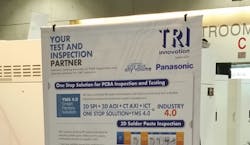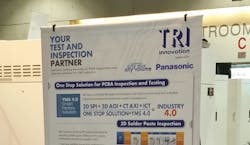What is Industry 4.0? (Not a rhetorical question)
Industry 4.0—everybody talks about it. It seemed to be the term most frequently discussed at last month’s IPC Apex Expo in San Diego. Test Research Inc. even had an equation defining the term:
That might make sense in the context of TRI’s test and inspection equipment and yield-management software for SMT manufacturing. But what does Industry 4.0 mean in the context of industry in general or other industry segments in particular? This is not a rhetorical question. EE-Evaluation Engineering’s June issue will include a staff-written article on Industry 4.0 (Plattform Industrie 4.0) and the Industrial Internet (as addressed by the Industrial Internet Consortium), and we invite your input. If you are involved with Industry 4.0 and the Industrial Internet, please respond to the questions at the end of this post.
But first by way of background, Industry 4.0 might be thought of as embracing cyberphysical systems that involve sensing, data acquisition, data storage and processing (including via the cloud), autonomous decision making, and control. (You may agree or disagree with this summation.)
According to Prof. Birgit Vogel-Heuser of the Institute of Automation and Information Systems at the Technical University of Munich (TUM), Industry 4.0 has “…a number of definitions, but no single one which is generally accepted. Or definitions are kept so general that they really don’t mean anything. Industry 4.0 is actually a concept with many different facets. It’s just not possible to summarize them all in a single sentence.”
She explains what Industry 4.0 is not: something you can buy off the shelf. She notes, “Trade-fair booths will often advertise with a banner saying something like ‘We have an Industry 4.0 PC.’ Utter nonsense. There’s no way a PC as such can be Industry 4.0—it’s just a device with software.”
Prof. Vogel-Heuser continues, “And at training events I often hear things like, ‘Tell me how Industry 4.0 will work at my company.’ There’s no such answer in general. Every company has to figure out for itself what parts of this plethora of Industry 4.0 components is interesting for the company, for its business, and its customers.”
Writing in Forbes, Bernard Marr posits four prerequisites for Industry 4.0: interoperability (machines, devices, sensors, and people communicate with one another), information transparency (systems create virtual copies of the physical world through sensor data to contextualize information), technical assistance (machines help humans make decisions and perform tasks that people would find too difficult or dangerous), and decentralized decision making (cyberphysical systems autonomously make simple decisions).
Whatever the definition of Industry 4.0, MarketsandMarkets forecasts healthy growth for the sensors, RFID devices and systems, industrial robotics, distributed control systems, autonomous haulage systems, condition monitoring systems, smart meters, camera systems, wired and wireless networking technologies, and PLM, MES, and SCADA software that can contribute to Industry 4.0 applications. The firm expects the Industrial IoT market to grow from $113.71 billion in 2015 to $195.47 billion by 2022, at a CAGR of 7.89% between 2016 and 2022.
If you are involved in Industry 4.0 and the Industrial Internet, we want to hear from you:
- Do you agree with Prof. Vogel-Heuser that Industry 4.0 cannot be defined in a single sentence? (If you disagree, please provide your definition.)
- Do you agree with her that Industry 4.0 is not available off-the-shelf? (If you disagree, what Industry 4.0 products do you offer or have you bought off the shelf?)
- Are OT vs. IT issues being solved, or is there much work still to be done in this area?
If you supply measurement and control capabilities for automation applications:
- What devices, systems, and software do you offer that can serve Industry 4.0 and Industrial Internet applications?
- What’s unique about your solutions?
- How important do you consider interoperability (e.g., via standards or cooperative agreements with other vendors), and if it’s important, what steps do you take to enhance interoperability?
- What support do you offer for local autonomous decision-making and/or cloud-based decision-making?
- How do you support your customers with maintenance, upgrades, and expansion of Industry 4.0 implementations?
If you have implemented or are implementing an Industry 4.0 project:
- Have you been able to buy off-the-shelf devices, systems, and software that you can adapt to Industry 4.0?
- Who performs integration—you, an equipment/software supplier, a third-party, or some or all of the above?
- What are the issues surrounding upgrades, maintenance, and expansion of Industry 4.0 implementations?
Please send your inputs by March 31 to [email protected].
Thanks for your help.
About the Author

Rick Nelson
Contributing Editor
Rick is currently Contributing Technical Editor. He was Executive Editor for EE in 2011-2018. Previously he served on several publications, including EDN and Vision Systems Design, and has received awards for signed editorials from the American Society of Business Publication Editors. He began as a design engineer at General Electric and Litton Industries and earned a BSEE degree from Penn State.


